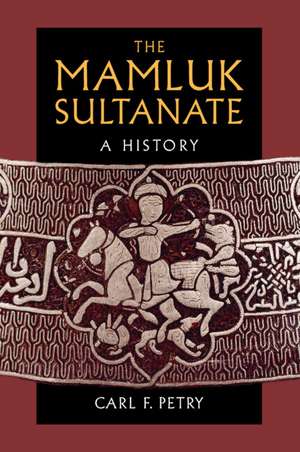The Mamluk Sultanate: A History
Autor Carl F. Petryen Limba Engleză Paperback – 25 mai 2022
| Toate formatele și edițiile | Preț | Express |
|---|---|---|
| Paperback (1) | 209.65 lei 6-8 săpt. | |
| Cambridge University Press – 25 mai 2022 | 209.65 lei 6-8 săpt. | |
| Hardback (1) | 532.53 lei 6-8 săpt. | |
| Cambridge University Press – 25 mai 2022 | 532.53 lei 6-8 săpt. |
Preț: 209.65 lei
Nou
Puncte Express: 314
Preț estimativ în valută:
40.12€ • 41.83$ • 33.34£
40.12€ • 41.83$ • 33.34£
Carte tipărită la comandă
Livrare economică 21 martie-04 aprilie
Preluare comenzi: 021 569.72.76
Specificații
ISBN-13: 9781108456999
ISBN-10: 1108456995
Pagini: 304
Dimensiuni: 151 x 228 x 20 mm
Greutate: 0.51 kg
Ediția:Nouă
Editura: Cambridge University Press
Colecția Cambridge University Press
Locul publicării:Cambridge, United Kingdom
ISBN-10: 1108456995
Pagini: 304
Dimensiuni: 151 x 228 x 20 mm
Greutate: 0.51 kg
Ediția:Nouă
Editura: Cambridge University Press
Colecția Cambridge University Press
Locul publicării:Cambridge, United Kingdom
Cuprins
Introduction; 1. Synopsis of events; 2. Ethos of the 'slave-soldiers' regime; 3. The mamluk sultanate from a global perspective; 4. Vocational classes: Bureaucrats, magistrates, scholastics, clerics; 5. The political economy; contexts of innovation; 6. The cultural legacy; patronage, audience, genres, historiography; 7. The rural environment, gender issues, minority communities, sufi practice; Reflections; Bibliography; Index.
Recenzii
'The wait is over - at last we have a true grand narrative of the Mamluk Sultanate in Egypt and Syria, a fascinating episode in world history. Encyclopedic in scope, full of insights, with riveting storytelling, Carl F. Petry's tour de force will remain the definitive tome on the subject for a long time to come.' Li Guo, University of Notre Dame
'This lucid and comprehensive survey of the Mamluk Sultanate (1250–1517) combines political and institutional history with coverage of intellectual life, popular culture, rural realities, women, religious minorities, and Sufis. Petry draws on his own vast expertise while making abundant use of primary sources and scholarship by other leading experts.' Jane Hathaway, Ohio State University
'Petry's synthesis of scholarship is deftly integrated with his in-depth erudition and knowledge of surviving source material. Moreover, the book's organization along with Petry's accessible prose make this volume a valuable and effective introduction for those unfamiliar with the history of the sultanate and the multifaceted field of Mamluk Studies.' Warren Schultz, DePaul University
'A comprehensive, systematic overview of the Mamluk Sultanate brought to life by dynamic case studies and vignettes. Highly readable and accessible, it is an indispensable reference for students and scholars, and an excellent introduction for anyone starting out in the field of Mamluk Studies.' Amina Elbendary, The American University, Cairo
'This lucid and comprehensive survey of the Mamluk Sultanate (1250–1517) combines political and institutional history with coverage of intellectual life, popular culture, rural realities, women, religious minorities, and Sufis. Petry draws on his own vast expertise while making abundant use of primary sources and scholarship by other leading experts.' Jane Hathaway, Ohio State University
'Petry's synthesis of scholarship is deftly integrated with his in-depth erudition and knowledge of surviving source material. Moreover, the book's organization along with Petry's accessible prose make this volume a valuable and effective introduction for those unfamiliar with the history of the sultanate and the multifaceted field of Mamluk Studies.' Warren Schultz, DePaul University
'A comprehensive, systematic overview of the Mamluk Sultanate brought to life by dynamic case studies and vignettes. Highly readable and accessible, it is an indispensable reference for students and scholars, and an excellent introduction for anyone starting out in the field of Mamluk Studies.' Amina Elbendary, The American University, Cairo
Notă biografică
Descriere
An engaging and accessible survey of the Mamluk Sultanate which positions the realm within the development of comparative political systems from a global perspective.
